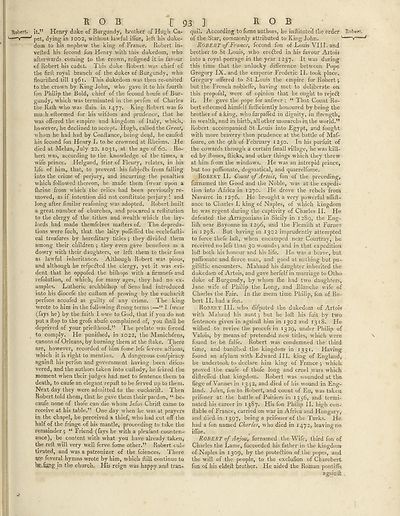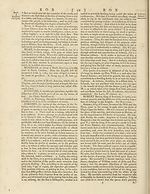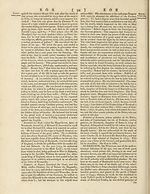Encyclopaedia Britannica, or, a Dictionary of arts, sciences, and miscellaneous literature : enlarged and improved. Illustrated with nearly six hundred engravings > Volume 18, RHI-SCR
(101) Page 93
Download files
Complete book:
Individual page:
Thumbnail gallery: Grid view | List view

ROB [ 93 ] ROB
■Robert, it.” Henry duke of Burgundy, brother of Hugh Ca-
■—» ' pet, dying in 1002, without lawful iffue, left his duke¬
dom to his nephew the king of France. Robert in¬
verted his fecond fon Henry with this dukedom, who
afterwards coming to the crown, refigned it in favour
of Robert his cadet. This duke Robert was chief of
the fir ft royal branch of the dukes of Burgundy, who
flouriftied till 1361. This dukedom was then re-united
to the crown by King John, who gave it to his fourth
fon Philip the Bold, chief of the fecond houfe of Bur¬
gundy, which was terminated in the perfon of Charles
the Rath who was (lain in 1477. King Robert was fo
much efteemed for his wifdom and prudence, that he
was offered the empire and kingdom of Italy, which,
however, he declined to accept. Hugh, called the Great,
whom he had had by Contlance, being dead, he caufed
his fecond fon Henry I. to be crowned at Rheims. He
died at Melun, July 20. 1031, at the age of 60. Ro¬
bert was, according to the knowledge of the times, a
wife prince. Helgand, friar of Fleury, relates, in his
life of him, that, to prevent his fubjefls from falling
into the crime of perjury, and incurring the penalties
which followed thereon, he made them fwear upon a
{brine from which the relics had been previoufly re¬
moved, as if intention did not conftitute perjury ! and
long after fimilar reafoning was adopted. Robert built
a great number of churches, and procured a reftitution
to the clergy of the tithes and wealth which the lay-
lords had made themfelves mailers of. The depreda¬
tions wTere fuch, that the laity poffefled the ecclefiafti-
cal treafures by hereditary titles •, they divided them
among their children ; they even gave benefices as a
dowry with their daughters, or left them to their fons
as lawful inheritance. Although Robert was pious,
and although he refpe&ed the clergy, yet it was evi¬
dent that he oppofed the bifhops with a firmnefs and
refolution, of which, for many ages, they had no ex¬
amples. Lutheric archbilhop of Sens had introduced
into his diocefe the cuftom of proving by the eucharitt
perfons accufed as guilty of any crime. The king
wrote to him in the following ftrong terms :—“ I fwear
(fays he) by the faith I owe to God, that if you do not
put a flop to the grofs abufe complained of, you iball be
deprived of your priefthood.” The prelate was forced
to comply. He punilhed, in 1022, the Manicheens,
canons of Orleans, by burning them at the Hake. There
are, however, recorded of him fome lefs fevere actions,
which it is right to mention. A dangerous confpiracy
againft his perfon and government having been dilco-
vered, and the authors taken into cuftody, he feized the
moment when their judges had met to fentence them to
death, to caufe an elegant repaft to be ferved up to them.
Next day they wrere admitted to the eucharift. Then
Robert told them, that he gave them their pardon, “ be-
caufe none of thofe can die whom Jefus Chriil came to
receive at his table.” One day when he was at prayers
in the chapel, he perceived a thief, who had cut off the.
half of the fringe of h is mantle, proceeding to take the
remainder 5 “ Friend (fays he with a pleafant counten¬
ance), be content with what you have already taken,
the reft will very well ferve fome other.” Robert cul¬
tivated, and was a patronizer of the fciences. There
Rre feveral hymns wrote by him, which ftilL continue to
in the church. His reign was happy and tran^
quil. According to fome authors, he inftituted the order P-obert.
of the Star, commonly attributed to King John. y—j
ROBERT of France, fecond fon of Louis VIII, and
brother to St Louis, who erected in his favour Artois
into a royal peerage in the year 1237. It was during
this time that the unlucky difference between Pope
Gregory IX. and the emperor Frederic II. took place.
Gregory offered to St Louis the empire for Robert j
but the French nobleffe, having met to deliberate on
this propofal, were of opinion that he ought to reject
it. He gave the pope for anfwer : “ That Count Ro¬
bert efteemed himfelf fufficienlly honoured by being the
brother of a king, who furpaffed in dignity, in llrength,
in wealth, and in birth, all other monarchs in the world.”
Robert accompanied St Louis into Egypt, and fought
with more bravery than prudence at the battle of Maf-
foure, on the 9th of February 1250. In his purfuit of
the cowards through a certain fmall village, he was kill¬
ed by ftones, Hicks, and other things which they threw
at him from the windows. He was an intrepid prince,
but too paflionate, dogmatical, and quarrelfome.
Robert II. Count of Artois, fon of the preceding,
furnamed the Good and the Noble, was at the expedi¬
tion into Africa in 1 270. Fie drove the rebels from
Navarre in 1276. He brought a very powerful aftill-
ance to Charles I. king of Naples, of which kingdom
he was regent during the captivity of Charles II. He
defeated the Arragonians in Sicily in 1289, the Eng-
lilh near Bayonne in 1296, and the Flemiih at Furnes
in 1298. But having in 1302 imprudently attempted
to force thefe laft, when encamped near Courtray, he
received no lefs than 30 wounds j and in that expedition
loft both his honour and his life. Fie was a brave, but
paflionate and fierce man, and good at nothing but pu-
gilillic encounters. Mahaud his daughter inherited the
dukedom of Artois, and gave herfelf in marriage to Otho
duke of Burgundy, by whom flie had two daughters,
Jane wife of Philip the Long, and Blanche wife of
Charles the Fair. In the mean time Philip, fon of Ro¬
bert II. had a fon.
Robert III. who difputed the dukedom of Artois
with Mahaud his aunt ; but he loft his fuit by two
fentences given in againft him in 1302 and 1318. He
wiftied to revive the proeefs in 1329, under Philip of
Valois, by means of pretended new titles, which were \
found to be falfe. Robert was condemned the third
time, and banifhed the kingdom in 1331. Having
found an afylum with Edward III. king of England,
he undertook to declare him king of France ; which
proved the. caufe of thofe long and cruel wars which
diftreffed that kingdom. Robert was wounded at the
fiege of Vannes in 1342, and died of his wound in Eng¬
land. John, fon to Robert, and count of Eu, was taken
prifoner at the battle of Poitiers in 1356, and termi¬
nated his career in 1387. His fon Philip II. high cun-
ftable of France, carried on war in Africa and Hungary,
and died in 1397, being a prifoner of the Turks. He
had a fon named Charles, who died in 1472, leaving no
iffue.
ROBERT of Anjou, furnamed the Wife, third fon of
Charles the Lame, fucceeded his father in the kingdom-
of Naples in 1309, by the proteflion of the popes, and
the w ill of the people, to the exclufion of Cbarobert
fon of hi§ eldeft brother. He aided the Roman pontiffs,
again ft
■Robert, it.” Henry duke of Burgundy, brother of Hugh Ca-
■—» ' pet, dying in 1002, without lawful iffue, left his duke¬
dom to his nephew the king of France. Robert in¬
verted his fecond fon Henry with this dukedom, who
afterwards coming to the crown, refigned it in favour
of Robert his cadet. This duke Robert was chief of
the fir ft royal branch of the dukes of Burgundy, who
flouriftied till 1361. This dukedom was then re-united
to the crown by King John, who gave it to his fourth
fon Philip the Bold, chief of the fecond houfe of Bur¬
gundy, which was terminated in the perfon of Charles
the Rath who was (lain in 1477. King Robert was fo
much efteemed for his wifdom and prudence, that he
was offered the empire and kingdom of Italy, which,
however, he declined to accept. Hugh, called the Great,
whom he had had by Contlance, being dead, he caufed
his fecond fon Henry I. to be crowned at Rheims. He
died at Melun, July 20. 1031, at the age of 60. Ro¬
bert was, according to the knowledge of the times, a
wife prince. Helgand, friar of Fleury, relates, in his
life of him, that, to prevent his fubjefls from falling
into the crime of perjury, and incurring the penalties
which followed thereon, he made them fwear upon a
{brine from which the relics had been previoufly re¬
moved, as if intention did not conftitute perjury ! and
long after fimilar reafoning was adopted. Robert built
a great number of churches, and procured a reftitution
to the clergy of the tithes and wealth which the lay-
lords had made themfelves mailers of. The depreda¬
tions wTere fuch, that the laity poffefled the ecclefiafti-
cal treafures by hereditary titles •, they divided them
among their children ; they even gave benefices as a
dowry with their daughters, or left them to their fons
as lawful inheritance. Although Robert was pious,
and although he refpe&ed the clergy, yet it was evi¬
dent that he oppofed the bifhops with a firmnefs and
refolution, of which, for many ages, they had no ex¬
amples. Lutheric archbilhop of Sens had introduced
into his diocefe the cuftom of proving by the eucharitt
perfons accufed as guilty of any crime. The king
wrote to him in the following ftrong terms :—“ I fwear
(fays he) by the faith I owe to God, that if you do not
put a flop to the grofs abufe complained of, you iball be
deprived of your priefthood.” The prelate was forced
to comply. He punilhed, in 1022, the Manicheens,
canons of Orleans, by burning them at the Hake. There
are, however, recorded of him fome lefs fevere actions,
which it is right to mention. A dangerous confpiracy
againft his perfon and government having been dilco-
vered, and the authors taken into cuftody, he feized the
moment when their judges had met to fentence them to
death, to caufe an elegant repaft to be ferved up to them.
Next day they wrere admitted to the eucharift. Then
Robert told them, that he gave them their pardon, “ be-
caufe none of thofe can die whom Jefus Chriil came to
receive at his table.” One day when he was at prayers
in the chapel, he perceived a thief, who had cut off the.
half of the fringe of h is mantle, proceeding to take the
remainder 5 “ Friend (fays he with a pleafant counten¬
ance), be content with what you have already taken,
the reft will very well ferve fome other.” Robert cul¬
tivated, and was a patronizer of the fciences. There
Rre feveral hymns wrote by him, which ftilL continue to
in the church. His reign was happy and tran^
quil. According to fome authors, he inftituted the order P-obert.
of the Star, commonly attributed to King John. y—j
ROBERT of France, fecond fon of Louis VIII, and
brother to St Louis, who erected in his favour Artois
into a royal peerage in the year 1237. It was during
this time that the unlucky difference between Pope
Gregory IX. and the emperor Frederic II. took place.
Gregory offered to St Louis the empire for Robert j
but the French nobleffe, having met to deliberate on
this propofal, were of opinion that he ought to reject
it. He gave the pope for anfwer : “ That Count Ro¬
bert efteemed himfelf fufficienlly honoured by being the
brother of a king, who furpaffed in dignity, in llrength,
in wealth, and in birth, all other monarchs in the world.”
Robert accompanied St Louis into Egypt, and fought
with more bravery than prudence at the battle of Maf-
foure, on the 9th of February 1250. In his purfuit of
the cowards through a certain fmall village, he was kill¬
ed by ftones, Hicks, and other things which they threw
at him from the windows. He was an intrepid prince,
but too paflionate, dogmatical, and quarrelfome.
Robert II. Count of Artois, fon of the preceding,
furnamed the Good and the Noble, was at the expedi¬
tion into Africa in 1 270. Fie drove the rebels from
Navarre in 1276. He brought a very powerful aftill-
ance to Charles I. king of Naples, of which kingdom
he was regent during the captivity of Charles II. He
defeated the Arragonians in Sicily in 1289, the Eng-
lilh near Bayonne in 1296, and the Flemiih at Furnes
in 1298. But having in 1302 imprudently attempted
to force thefe laft, when encamped near Courtray, he
received no lefs than 30 wounds j and in that expedition
loft both his honour and his life. Fie was a brave, but
paflionate and fierce man, and good at nothing but pu-
gilillic encounters. Mahaud his daughter inherited the
dukedom of Artois, and gave herfelf in marriage to Otho
duke of Burgundy, by whom flie had two daughters,
Jane wife of Philip the Long, and Blanche wife of
Charles the Fair. In the mean time Philip, fon of Ro¬
bert II. had a fon.
Robert III. who difputed the dukedom of Artois
with Mahaud his aunt ; but he loft his fuit by two
fentences given in againft him in 1302 and 1318. He
wiftied to revive the proeefs in 1329, under Philip of
Valois, by means of pretended new titles, which were \
found to be falfe. Robert was condemned the third
time, and banifhed the kingdom in 1331. Having
found an afylum with Edward III. king of England,
he undertook to declare him king of France ; which
proved the. caufe of thofe long and cruel wars which
diftreffed that kingdom. Robert was wounded at the
fiege of Vannes in 1342, and died of his wound in Eng¬
land. John, fon to Robert, and count of Eu, was taken
prifoner at the battle of Poitiers in 1356, and termi¬
nated his career in 1387. His fon Philip II. high cun-
ftable of France, carried on war in Africa and Hungary,
and died in 1397, being a prifoner of the Turks. He
had a fon named Charles, who died in 1472, leaving no
iffue.
ROBERT of Anjou, furnamed the Wife, third fon of
Charles the Lame, fucceeded his father in the kingdom-
of Naples in 1309, by the proteflion of the popes, and
the w ill of the people, to the exclufion of Cbarobert
fon of hi§ eldeft brother. He aided the Roman pontiffs,
again ft
Set display mode to:
![]() Universal Viewer |
Universal Viewer | ![]() Mirador |
Large image | Transcription
Mirador |
Large image | Transcription
Images and transcriptions on this page, including medium image downloads, may be used under the Creative Commons Attribution 4.0 International Licence unless otherwise stated. ![]()
| Permanent URL | https://digital.nls.uk/193020020 |
|---|
| Attribution and copyright: |
|
|---|
| Description | Ten editions of 'Encyclopaedia Britannica', issued from 1768-1903, in 231 volumes. Originally issued in 100 weekly parts (3 volumes) between 1768 and 1771 by publishers: Colin Macfarquhar and Andrew Bell (Edinburgh); editor: William Smellie: engraver: Andrew Bell. Expanded editions in the 19th century featured more volumes and contributions from leading experts in their fields. Managed and published in Edinburgh up to the 9th edition (25 volumes, from 1875-1889); the 10th edition (1902-1903) re-issued the 9th edition, with 11 supplementary volumes. |
|---|---|
| Additional NLS resources: |
|

